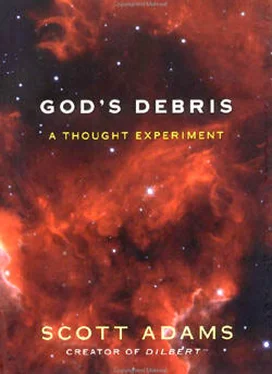“To a God not bound by the limits of human practicality, every tiny part of your body would be as action-packed and meaningful as the parts of any rock or tree or bug. And the sum of your parts that form the personality and life we find so special and amazing would seem neither special nor amazing to an omnipotent being.
“It is absurd to define God as omnipotent and then burden him with our own myopic view of the significance of human beings. What could possibly be interesting or important to a God that knows everything, can create anything, can destroy anything. The concept of ‘importance’ is a human one born out of our need to make choices for survival. An omnipotent being has no need to rank things. To God, nothing in the universe would be more interesting, more worthy, more useful, more threatening, or more important than anything else.”
“I still think people are more important to God than animals and plants and dirt. I think that’s obvious,” I argued.
“What is more important to a car, the steering wheel or the engine?” he asked.
“The engine is more important because without an engine, there is no reason to steer,” I reasoned.
“But unless you have both the engine and the steering wheel, the car is useless, isn’t it?” he asked.
“Well, yes. I guess that’s true,” I admitted.
“The steering wheel and the engine are of equal importance. It is a human impulse—composed of equal parts arrogance and instinct—to believe we can rank everything in our environment. Importance is not an intrinsic quality of the universe. It exists only in our delusion-filled minds. I can assure you that humans are not in any form or fashion more important than rocks or steering wheels or engines.”
Reincarnation, UFOs, and God
I didn’t know how much of the old man’s opinions to take at face value. Everything he talked about had a kind of logic to it, but so do many things that are nonsense. I decided it was best just to listen. Whatever was happening to me, at least it was different. I liked different.
He started again. “If you want to understand UFOs, reincarnation, and God, do not study UFOs, reincarnation, and God. Study people.”
“Are you saying none of those things are real?” I was offended by his certainty, given the thousands of eyewitness accounts for each of those things.
“No,” he said, “I am saying that UFOs, reincarnation, and God are all equal in terms of their reality.”
“Do you mean equally real or equally imaginary?”
“Your question reveals your bias for a binary world where everything is either real or imaginary. That distinction lies in your perceptions, not in the universe. Your inability to see other possibilities and your lack of vocabulary are your brain’s limits, not the universe’s.”
“There has to be a difference between real and imagined things,” I countered. “My truck is real. The Easter Bunny is imagined. Those are different.”
“As you sit here, your truck exists for you only in your memory, a place in your mind. The Easter Bunny lives in the same place. They are equal.”
“Yes, but I can go out and drive my truck. I can’t pet the Easter Bunny.”
“Was the rain from this morning real?”
“Of course.”
“But you can’t see or touch that rain now, can you?”
“No.”
“Like the Easter Bunny, the past exists only in your mind,” he said. “Likewise, the future exists only in your mind because it has not happened.”
“But I can find evidence of the past. I can check with the weather people and confirm that it rained this morning.”
“And when you get that confirmation, it would instantly become the past itself. So in effect, you would be using the past, which does not exist, to confirm something else from the past. And if you repeat the process a thousand times, with a thousand different pieces of evidence, together they would still be nothing but impressions of the past supporting other impressions of the past.”
“That’s just mental gymnastics. You’re playing with words,” I said.
“An insane person believes his world is consistent. If he believes the government is trying to kill him, he will see ample evidence of his belief in the so-called real world. He will be wrong, but his evidence is no better or worse than your evidence that it rained this morning. Both of you will be converting evidence of the present into impressions stored in your minds and you will both be certain your evidence is solid and irrefutable. Your mind will mold the facts and shape the clues until it all fits.”
“That might be true of crazy people, but not normal people.”
“Clinical psychologists have proven that ordinary people will alter their memories of the past to make them fit their perceptions. It is the way all normal brains function under ordinary circumstances.”
“I didn’t know that.”
“Now you do,” he replied.
“If you were God,” he said, “what would you want?”
“I don’t know. I barely know what I want, much less what God wants.”
“Imagine that you are omnipotent. You can do anything, create anything, be anything. As soon as you decide you want something, it becomes reality.”
I waited, knowing there was more.
He continued. “Does it make sense to think of God as wanting anything? A God would have no emotions, no fears, no desires, no curiosity, no hunger. Those are human shortcomings, not something that would be found in an omnipotent God. What then would motivate God?”
“Maybe it’s the challenge, the intellectual stimulation of creating things,” I offered.
“Omnipotence means that nothing is a challenge. And what could stimulate the mind of someone who knows everything?”
“You make it sound almost boring to be God. But I guess you’ll say boredom is a human feeling.”
“Everything that motivates living creatures is based on some weakness or flaw. Hunger motivates animals. Lust motivates animals. Fear and pain motivate animals. A God would have none of those impulses. Humans are driven by all of our animal passions plus loftier-sounding things like self-actualization and creativity and freedom and love. But God would care nothing for those things, or if he cared would already have them in unlimited quantities. None of them would be motivating.”
“So what motivates God?” I asked. “Do you have the answer to that question, or are you just yanking my chain?”
“I can conceive of only one challenge for an omnipotent being—the challenge of destroying himself.”
“You think God would want to commit suicide?” I asked.
“I’m not saying he wants anything. I’m saying it’s the only challenge.”
“I think God would prefer to exist than to not exist.”
“That’s thinking like a human, not like a God. You have a fear of death so you assume God would share your preference. But God would have no fears. Existing would be a choice. And there would be no pain of death, nor feelings of guilt or remorse or loss. Those are human feelings, not God feelings. God could simply choose to discontinue existence.”
“There’s a logical problem here, according to your way of thinking,” I said. “If God knows the future, he already knows if he will choose to end his existence, and he knows if he will succeed at it, so there’s no challenge there, either.”
“Your thinking is getting clearer,” he said. “Yes, he will know the future of his own existence under normal conditions. But would his omnipotence include knowing what happens after he loses his omnipotence, or would his knowledge of the future end at that point?”
“That sounds like a thoroughly unanswerable question. I think you’ve hit a dead end,” I said.
Читать дальше












